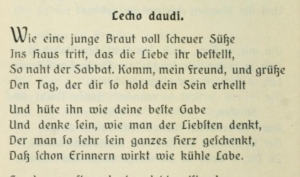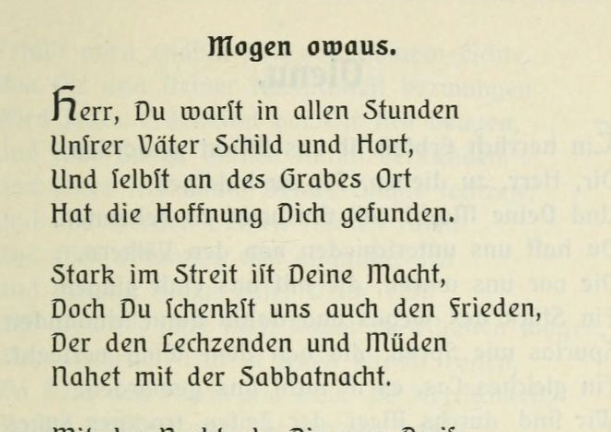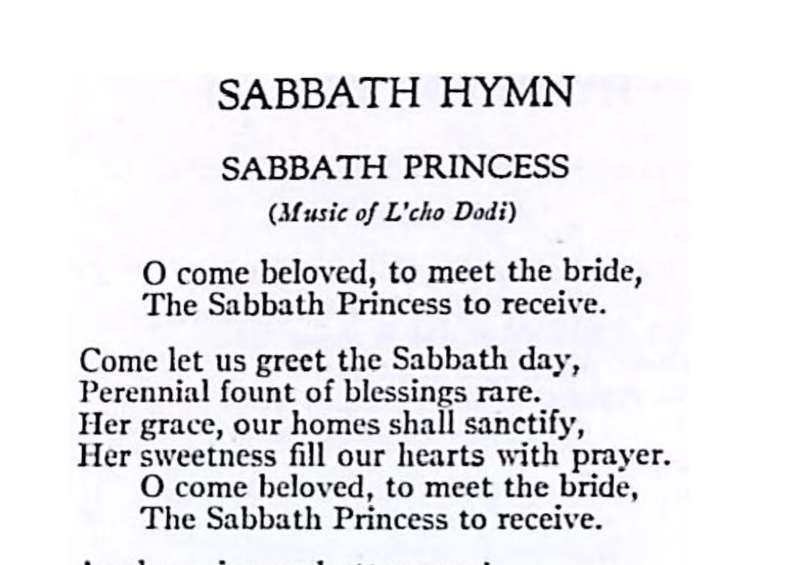| Source (German) | Translation (English) |
|---|---|
Lecho daudi. |
Lekha Dodi. |
Wie eine junge Braut voll scheuer Süße Ins Haus tritt, das die Liebe ihr bestellt, So naht der Sabbat. Komm, mein Freund, und grüße Den Tag, der dir so hold dein Sein erhellt |
How a young bride full of shy sweetness Steps into the house that love has summoned for her, So approaches the Sabbath. Come, my friend, and greet The day that so gently illumines your being |
Und hüte ihn wie deine beste Gabe Und denke sein, wie man der Liebsten denkt, Der man so sehr sein ganzes Herz geschenkt, Daß schon Erinnern wirkt wie kühle Labe. |
And guard it like your best gift And think of him as you think of your loved one, To whom one has given so much of one’s heart, That even their memory is like cool refreshment. |
Er, der zuerst geplant, zuletzt entstanden, Er ist des Segens Quell in deinem Sein, Er kommt — und all dein Leid, es schlummert ein, Ein Sabbattraum löst dich aus Knechtschaftsbanden. |
He who planned first, created at last, He is the fount of blessing in your being, He comes — and all your sorrow, it slumbers, A Sabbath dream loosens you from bonds of servitude. |
Und wieder schaust du Ẓions Herrlichkeit Und siehst die Stadt des Herrn in neuer Schöne Und siehst zu ihren Süßen ihre Söhne Vergessen der Verbannung herbes Leid. |
And again you behold Ẓion’s glory And view the city of the Lord in fresh beauty And see her sons among her sweethearts Forgetting the bitter suffering of exile. |
Sie schütteln ab den Staub der Wanderstraßen Und tuen an ein neues Feierkleid, Und find für den Erlöser nun bereit, Den sie im tiefsten Leide nie vergaßen. |
They shake off the dust of the wandering streets And put on a new festive dress, And ready themselves for the Redeemer, Whom they never forgot in their deepest sorrow. |
Es kommt aus Bethlehem des Isai Sohn Und ist ein König denen, die gestritten, Und ist ein Helfer denen, die gelitten, Die ihm aus Tränen bauten seinen Tron. |
He comes from Bethlehem, the son of Yishai. And is a king to those who disputed, And is a helper to those who suffered, Who built his throne out of their tears. |
Dein Stern geht auf und hell erstrahlt dein Licht, Genug der Qual, der Herr hat dich erweckt! Jerusalem, wie warst du schmachbedeckt, Nun birgst du länger dich errötend nicht. |
Your star rises and your light shines brightly, Enough torment, the Lord has awakened you! Jerusalem, how you were once covered with shame, Now you no longer hide your blushing. |
Nun beugt dich länger nicht die heiße Scham, Wie eine Fürstin strahlest du aufs neue Und lohnest deinen Kindern ihre Treue Nun, da die Stunde der Vergeltung kam. |
Now intense shame no longer twists you, Like a princess you shine anew And reward your children for their loyalty Now that the hour of retribution has come. |
Die dich beraubt, die wurden selbst vernichtet, Die dich geschmäht, die hat nun Gott verschmäht, Wie dürres Gras, so wurden sie gemäht, Sie höhnten dich, nun wurden sie gerichtet. |
Those who robbed you were themselves destroyed, Those who reviled you, God has now spurned, Like dry grass, they were cut down, Those who scorned you, now they are judged. |
Du aber dehnst dich aus und streckst die Glieder Und wie der Frühling blüht, so blühst auch du, Und staunend sehen wir dem Wunder zu Und jubeln dir zum Preise unsre Lieder. — |
But you extend and stretch the limbs And as spring blossoms, so do you, And in wonder we watch the miracle And sing our songs in praise of you. — |
So bringt den Frieden in dein müdes Herz Der Sabbat und löscht Leid und Kummer aus, Im hellen Lichterglanz erstrahlt dein Haus Und du vergißt selbst deines Volkes Schmerz … |
So bring peace to your weary heart [with] The Sabbath, and wipe away sorrow and grief, In the bright light your house shines And you forget even your people’s distress … |
Wie eine junge Braut voll scheuer Süße Ins Haus tritt, das die Liebe ihr bestellt, So naht der Sabbat. Komm, mein Freund, und grüße Den Tag, der dir so hold dein Sein erhellt. |
How a young bride full of shy sweetness Steps into the house that love has summoned for her, So approaches the Sabbath. Come, my friend, and greet The day that so gently illumines your being. |
This paraliturgical reflection of the piyyut “Lekha Dodi” by Lise Tarlau (“Lecho daudi”) can be found in Rabbi Max Grunwald’s anthology of Jewish women’s prayer, Beruria: Gebet- und Andachtsbuch für jüdische Frauen und Mädchen (1907), pages 74-76.
The transcription of the German provided machine-readable text for machine translations by DeepL, which we then edited for accuracy and clarity. We welcome any/all corrections, improvements, and additional transcriptions and translations of this work’s contents. –Aharon Varady
Source(s)


“Lecho daudi | Lekha Dodi, a paraliturgical adaptation by Lise Tarlau (1907)” is shared through the Open Siddur Project with a Creative Commons Attribution-ShareAlike 4.0 International copyleft license.










Leave a Reply